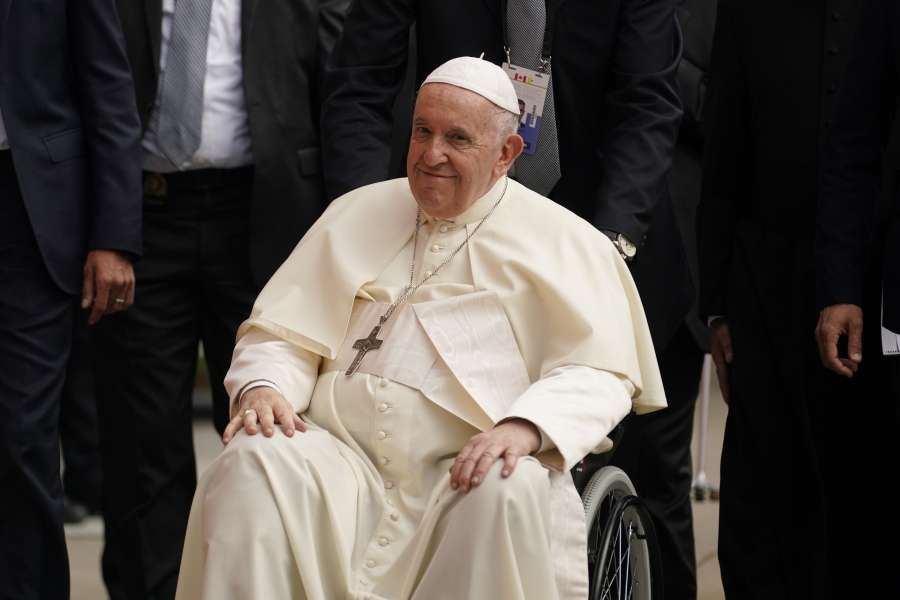EDMONTON, Alberta (AP) — Pope Francis is presiding over his first big Mass in Canada on Tuesday to honor grandparents, a day after he apologized for the Catholic Church’s role in severing generations of Indigenous family ties by participating in Canada’s “disastrous” residential school system.
Tens of thousands of people were expected for the Mass at the Commonwealth Stadium in Edmonton, Alberta, to mark the Feast of St. Anne, the grandmother of Jesus and a figure of particular veneration for Canadian Catholics. Later Tuesday, Francis was continuing with his ode to grandparents by leading a prayer service at one of North America’s most popular pilgrimage sites, Lac Ste. Anne, considered to be a place of healing.
It wasn’t clear if Francis would actually celebrate the Mass himself or designate someone else to lead while he presides sitting from the side of the altar, as he has done in recent months because his strained knee ligaments make standing and walking difficult. Either way, Francis was nevertheless expected to deliver the homily.
Francis has long lauded the role of grandmothers in passing the faith onto younger generations, citing his own experience with his grandmother, Rosa, while growing up in Buenos Aires. For several months, Francis has delivered weekly catechism lessons on the need to treasure grandparental wisdom and not discard them as part of today’s “culture of waste.”
Francis’ message has even greater resonance in Canada, given Indigenous families were torn apart by the church-enforced government policy of forcible assimilation.
More than 150,000 Native children in Canada were taken from their homes and forced to attend government-funded Christian schools from the 19th century until the 1970s in an effort to isolate them from the influence of their families and culture. The aim was to Christianize and assimilate them into mainstream society, which previous Canadian governments considered superior.
In his first event in Canada, Francis on Monday blasted the residential school policy as a “disastrous error” blasted the residential school policy as a “disastrous error” that did “catastrophic” harm to Indigenous peoples and their families. At the site of a former residential school in Maskwacis, he apologized for the “evil committed by so many Christians against the Indigenous peoples” and vowed further investigation and steps to promote healing.
Reaction to his visit and words was mixed: Some survivors stayed away and criticized the decision of Indigenous leaders to present Francis with a feathered headdress, which is a sign of respect. Others welcomed his apology as genuine and praised the attention his visit had drawn to the horrors of the residential school system.
Indigenous community leaders urged him to make good on his pledge to continue the path of reconciliation with concrete action: turning over church records about the fate of Indigenous children who died at schools, funding therapeutic healing programs for survivors and facilitating investigations of those responsible for the abuses.
Francis “can’t just say sorry and walk away,” said Chief Tony Alexis of the Alexis Nakota Sioux Nation.
Chief Vernon Saddleback of Samson Cree Nation said a lot of “survivors and thrivers” in his community were pleased. “Words cannot describe how important today is for the healing journey for a lot of First Nations people,” he told reporters afterward.
Lac St. Anne has long been a place of healing, a century-old pilgrimage site where the faithful come and wade into the waters. Francis was to preside over a liturgy of the word service there late Tuesday and bless the waters. In the runup to the pope’s visit, Alberta health authorities issued a blue-green algae bloom advisory for the lake, warning visitors to avoid contact with the blooms and refrain from wading where the algae are visible.
The lake is known as Wakamne, or “God’s Lake” to the Alexis Nakota Sioux Nation who live nearby and Manito Sahkahiga, or “Spirit Lake” by the Cree. The name “Lac Ste Anne” was given to it by the Rev. Jean-Baptiste Thibault, the first Catholic priest to establish a mission on the site.
Francis’ has said his six-day visit, which also will take him to Quebec City and northern Iqaluit, Nunavut, is a “penitential pilgrimage” to atone for the Catholic Church’s role in the residential school system. It fulfills a key recommendation of Canada’s Truth and Reconciliation Commission, which sought a papal apology to be delivered on Canadian soil.



